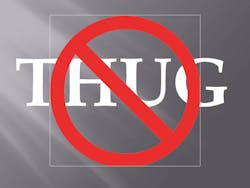The PC police (politically correct) have issued an arrest warrant for yet another word. Their heavy-handed tactics in the past have resulted in the removal of dozens of words from our lexicon, ones that the self-proclaimed arbiters of our language find offensive. The latest offender about to be handcuffed and thrown into the clink?—the word “thug.”
This genesis of this made up controversy was the conclusion of a recent NFL title game, in which the Seattle Seahawks bested the San Francisco Forty-Niners. It was a hard fought contest, one filled with emotion and pent-up frustration. Cornerback Richard Sherman sealed the Hawks victory on the last play of the game by deflecting a pass intended for receiver Michael Crabtree. Apparently, there was bad blood between the two players even before the combatants took the field.
In any case, after the deflected pass ended the game, Sherman made a choking gesture toward the Niners sideline. The NFL deemed the display unsportsmanlike, and Sherman was fined almost $8,000.00. The real controversy, however, was the post-game interview that Sherman gave on the field. He ranted and raved about his superior abilities and his opponent’s lack of same. His remarks were not well received by many viewers, and afterward the internet and sports pages were abuzz with negative comments. Sherman was called a number of names, some I won’t repeat, but one word stood out—thug.
Days later, while still in the throes of his adrenaline-filled interview, Sherman responded to his detractors by exclaiming that referring to him as a thug is tantamount to calling him the N-word. Really?
I have been using the word thug for years. I’ve used it repeatedly in my Officer.com articles since 2004. I’ve also used it in novels that I’ve written. The instances in which I’ve referred to someone as a thug have occurred when that person has done something illegal, or has hurt or otherwise taken advantage of someone else. At no time has there ever been a racial connotation attached to the label. Thugs come from all walks of life, races, and can be either gender. To ascribe the word to a particular race is to bastardize the definition of the term, particularly when used in law enforcement circles.
If one researches the word on Wikipedia, the first definition of thug is this: “A common criminal who treats others violently and roughly, often for hire.” Further investigation of the etymology of the term thug shows that it evolved in India around 1810. A thug was a member of a gang of murderers and robbers who strangled their victims. Over the years, a host of Indian words have found their way into the English language, and in doing so some have taken on different meanings. By 1839, the term thug evolved to include additional meanings such as, ruffian and cutthroat.
Never one to ignore a controversy, former NBA superstar, Charles Barkley, added his voice to the public forum regarding the “T” word. During an interview on CNN, Sir Charles posited his theory that, he believes “thug” and “street cred” are racial slurs that are equivalent to the N-word. The interviewer answered Barkley’s questionable charge by telling him that the word thug has nothing to do with the African-American race. In fact, the host cited incidences when Russian President Putin and House Speaker Boehner were referred to as thugs. He went on to explain that the term, “street cred” was used in political instances when referring to garnering respect and support of both respective bases.
So my question to the reader(s) is this: Do you feel the words thug and street cred are code words used as racial slurs? Please respond in the comment section. I will pass on the results in a future article.
Stay Safe, Brothers and Sisters!
Links:
http://en.wikipedia.org/wiki/Thug
http://www.etymonline.com/index.php?term=thug
http://www.breitbart.com/Breitbart-Sports/2014/01/24/charles-barkley-thug-street-cred-racial-slur

John Wills
John M. Wills is a former Chicago police officer and retired FBI agent. He is a freelance writer and award-winning author in a variety of genres, including novels, short stories and poetry. John also writes book reviews for the New York Journal of Books, and is a member of the National Book Critics Circle. His new book, The Year Without Christmas, is available now. Visit John at: www.johnmwills.com.



